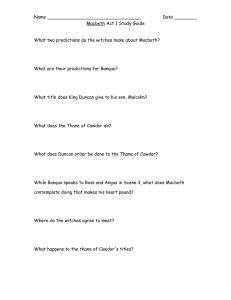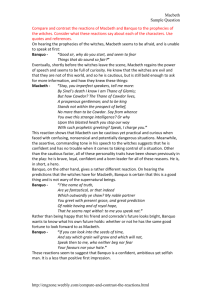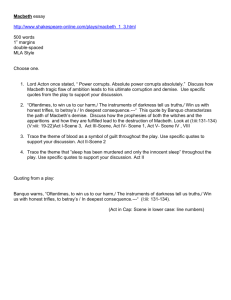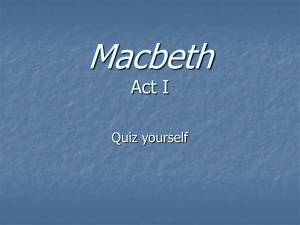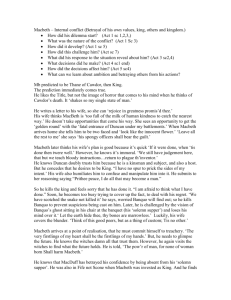Shakespeare Web materials
advertisement
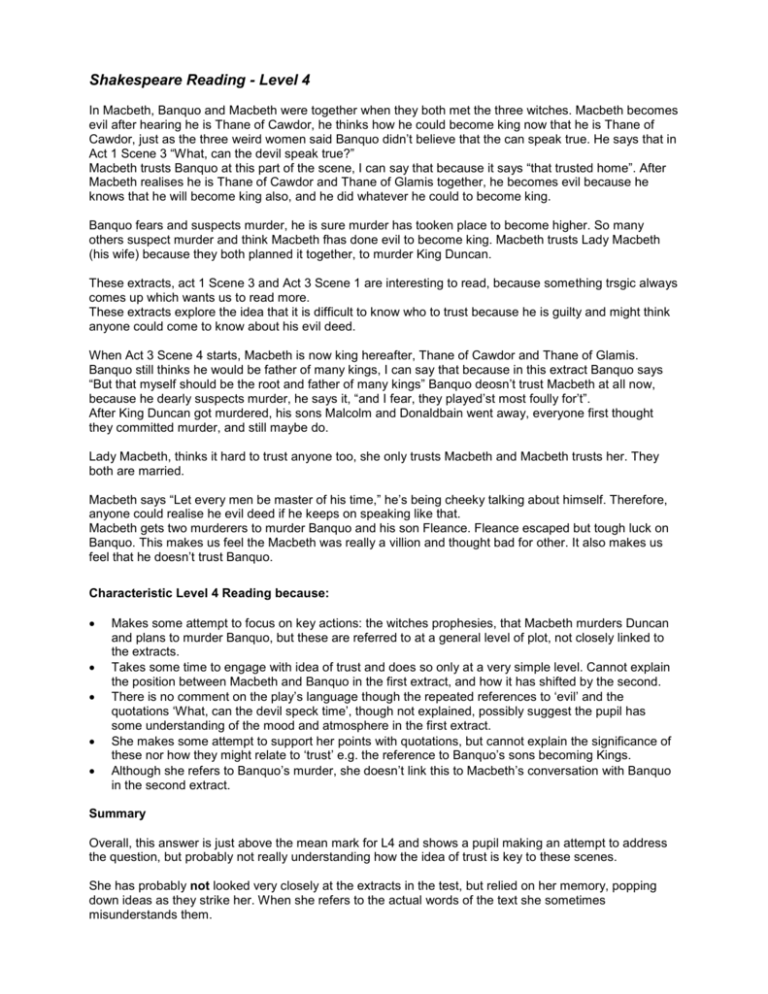
Shakespeare Reading - Level 4 In Macbeth, Banquo and Macbeth were together when they both met the three witches. Macbeth becomes evil after hearing he is Thane of Cawdor, he thinks how he could become king now that he is Thane of Cawdor, just as the three weird women said Banquo didn’t believe that the can speak true. He says that in Act 1 Scene 3 “What, can the devil speak true?” Macbeth trusts Banquo at this part of the scene, I can say that because it says “that trusted home”. After Macbeth realises he is Thane of Cawdor and Thane of Glamis together, he becomes evil because he knows that he will become king also, and he did whatever he could to become king. Banquo fears and suspects murder, he is sure murder has tooken place to become higher. So many others suspect murder and think Macbeth fhas done evil to become king. Macbeth trusts Lady Macbeth (his wife) because they both planned it together, to murder King Duncan. These extracts, act 1 Scene 3 and Act 3 Scene 1 are interesting to read, because something trsgic always comes up which wants us to read more. These extracts explore the idea that it is difficult to know who to trust because he is guilty and might think anyone could come to know about his evil deed. When Act 3 Scene 4 starts, Macbeth is now king hereafter, Thane of Cawdor and Thane of Glamis. Banquo still thinks he would be father of many kings, I can say that because in this extract Banquo says “But that myself should be the root and father of many kings” Banquo deosn’t trust Macbeth at all now, because he dearly suspects murder, he says it, “and I fear, they played’st most foully for’t”. After King Duncan got murdered, his sons Malcolm and Donaldbain went away, everyone first thought they committed murder, and still maybe do. Lady Macbeth, thinks it hard to trust anyone too, she only trusts Macbeth and Macbeth trusts her. They both are married. Macbeth says “Let every men be master of his time,” he’s being cheeky talking about himself. Therefore, anyone could realise he evil deed if he keeps on speaking like that. Macbeth gets two murderers to murder Banquo and his son Fleance. Fleance escaped but tough luck on Banquo. This makes us feel the Macbeth was really a villion and thought bad for other. It also makes us feel that he doesn’t trust Banquo. Characteristic Level 4 Reading because: Makes some attempt to focus on key actions: the witches prophesies, that Macbeth murders Duncan and plans to murder Banquo, but these are referred to at a general level of plot, not closely linked to the extracts. Takes some time to engage with idea of trust and does so only at a very simple level. Cannot explain the position between Macbeth and Banquo in the first extract, and how it has shifted by the second. There is no comment on the play’s language though the repeated references to ‘evil’ and the quotations ‘What, can the devil speck time’, though not explained, possibly suggest the pupil has some understanding of the mood and atmosphere in the first extract. She makes some attempt to support her points with quotations, but cannot explain the significance of these nor how they might relate to ‘trust’ e.g. the reference to Banquo’s sons becoming Kings. Although she refers to Banquo’s murder, she doesn’t link this to Macbeth’s conversation with Banquo in the second extract. Summary Overall, this answer is just above the mean mark for L4 and shows a pupil making an attempt to address the question, but probably not really understanding how the idea of trust is key to these scenes. She has probably not looked very closely at the extracts in the test, but relied on her memory, popping down ideas as they strike her. When she refers to the actual words of the text she sometimes misunderstands them. Shakespeare Reading - Level 5 Referring to Act 1 Scene 3, this extract explores the idea that it is difficult to know who to trust because the phrase “can the devil speak true.” This phrase emphasises the fact that the devil doesn’t tell the turth meaning that you can’t really trust anybody their just as bad as the devil. Also in this scene Macbeth ask Banquo does he want his children to be king. This tells the audience that Macbeth has took it seriously what the witches have said to him. Banquo doesn’t trust what the witches have said. “The instruments of darkness tell us truths”. What Banquo means when he says this is that the witches of darkness tell them truth. They told Macbeth that he would become Thane of Cawdor and told Banquo that his children would become king. This is Act 3 Scene 1. In this extract from scene 1 it shows the audience that it is difficult to know who to trust because in this scene Banquo is starting to suspect Macbeth. A phrase which makes me think that you can’t trust anybody is “Our fears in Banquo stick deep” this means that Macbeth doesn’t trust him and he never will as his fears for him stick deep inside him. Between lines 60 and 73 Macbeth is saying Banquo is jealous that the crown went to Macbeth and not to Banquo’s children even though that’s what the witches said. Macbeth is saying that he is the champion and that know one can ever defeat him basically. Characteristic Level 5 Reading because: This example is above the mean and in the better half of answers from pupils achieving L5 overall. Shows markedly better understanding of the significance of extracts than the examplar of a L4 pupils answer. The pupil is beginning to attempt some of the aspects of the T/L implications, and not others. The first paragraph on Act 1: 3 shows some attempt to link what the characters say to the idea of trust, and offers a couple of overall points on Macbeth and Banquo’s attitude to the witches. Act 3:1 shows understanding of Banquo’s and Macbeth’s mutual distrust, but cannot make much sense of Macbeth’s soliloquy. Attempts to examine the language in relation to the idea of trust but rather than being able to link the language to the dramatic context it offers explanations of what phrases ‘mean’ (e.g. paragraph 1,2). She does manage to link the reference to motivation (Macbeth’s fears sticking deep). Still dealing with quotations in terms of ‘this means that’ rather than by using them to support points. Summary Overall, the pupil is still at the stage of focusing on what the text means and conveys little sense of these as extracts from a play. Hence is not able to see the significance of what is said in terms of a drama e.g. no reference to use of asides in Act 1:3. Shakespeare Reading - Level 6 I think that Malvolio doesn’t deserve sympathy in the first extract, because he is trying to make them feel stupid. He says ‘My masters, are you mad?’ This shows that he is trying to make them feel mad and stupid. Malvolio thinks that he’s really cool, in the first extract, because he says ‘My Lady bade me tell you….’ This shows he thinks he’s really ‘in’ with Olivia, and really close to her. He is being horrible, and blaming Marie for what the others are doing. He says, ‘Mistress Mary, if you…… uncivil rule.’ This shows that he is scared to blame Sir Toby or Sir Andrew, because they are higher up than him. But Marie is just a servant, like him, so it doesn’t matter. He is bringing his religion into other people’s lives. We know this, because Sir Toby says, ‘Dost thou think…….. cakes and ale?’ This shows that Malvolio is a puritan, and he’s trying to influence other people. I think he needs a bit of sympathy in the first extract, though, because he hasn’t got a clue about the trick they’re going to play on him, and after all he is just trying to do his job. I think he needs a lot of sympathy in the second extract. When they tell him that the house is dark, you have to feel sorry for him, because he is trying to make them believe him. We know this because it says ‘I am not mad, Sir Topas; I say to you this house is dark’. He’s obviously trying to make them believe him, but they won’t. It shows this by feste saying ‘Madman, thou ernest,’ when Malvolio has just said he is not mad. And when Feste asks Malvolio some questions, and Mavolio answers them correctly, Feste pretends that Malvolio has answered them wrongly. We know this because it says ‘ Fare thee………….Fare thee well.’ This shows that feste is still trying to make Malvolio believe that he is mad, and being horrible. When Malvolio is pleading, he is saying ‘Sir Topas, Sir Topas, good Sir Topas.’ This shows that he is really feeling down, because in his normal state in mind, he would never say ‘good Sir Topas’. This shows that he needs sympathy. To conclude, I think that Malvolio definitely needs next to no sympathy in the first extract, but a lot in the second, because in both scenes he is in a different circumstance. It’s almost as if he’s got a totally different character in both scenes. Characteristic Level 6 Reading because: This answer by a pupil who achieved L6 in reading overall, is somewhat above the mean mark. It shows the pupil just beginning to move towards some of the characteristics of answers by L7 pupils, as summarised in the T/L implications. Keeps a clear focus on the idea of sympathy throughout and pays attention to the second extract as well as the first, acknowledging the difference in Malvolio’s position, and hence to the audience’s response to him. Closer engagement with some aspects of the text than characteristic answers of a L5, and shows good understanding of Malvolio’s character and motivation, especially in the first extract (e.g. paragraphs 2, 3, 4). However, considerable portions of text are not referred to, and some points are more general than others (e.g. paragraphs 5, 7) The pupil shows some awareness of the significance of the language in relation to dramatic effect (e.g. paragraph 2 ref. to ‘my Lady bade me’, in paragraph 6 ref to Feste calling Malvolio ‘madman’ and paragraph 8 with the emphasis on ‘good Sir Topas’) but considerable parts are passed over and the pupil cannot always capture the full effect of the language referred to e.g. Sir Toby’s angry response to Mavolio re: his virtue and ‘no cakes and ale’. Pupil uses quotation quite efficiently and selection is usually appropriate, but as with L5 pupil still tendency to select a quotation and explain it, (‘this shows’) rather than integrating quotations into the discussion of the key ideas of whether Malvolio deserves sympathy. Shakespeare Reading - Level 7 These extracts explore the idea it is difficult to know whom to trust because of changes in Macbeth and other characters. At the start of the play Macbeth is a brave hero and Duncan admires him. This is ironic because he later kills Duncan. This is only one example of how the trust in someone misleads you completely. In Act 1 scene 3 when Ross and Angus give the news to Macbeth that he is Thane of Cawdor, Banquo and Macbeth are shocked and start to question themselves whether this can be or if the witches were telling the truth. “What can the devil speak true?” (Act 1 scence 3 L.105) Banquo is questioning whether the witches were right. This amazement and shock suggests that he didn’t trust the witches predictions and that the doesn’t want to believe that they are true. Macbeth then says”The Thane of Cawdor lives. Why do you dress me in borrowed robes?” ((Act 1 Scence 3 L.106) Macbeth thinks Ross and Angus are wrong because the Thane of Cawdor still lives. “burrowed robes” suggests that the robe still belongs to the Thane of Cawdor and Macbth shouldn’t have them. By this Macbeth is pushing away the belief that he is Thane of Cawdor. After Macbeth has an aside in Act 1 scene 3 after ROSS AND Angus have told him about being Thane of Cawdor, he says to Banquo “do you not hope your children shall be kings, when those that “do you not hope your children shall be kings, when those that gave the Thane of Cawdor to me promised no less to them?” This Q note highlights that Macbeth is so excited about the prophecies that have come true he is starting to trust the witches predictions. When he asks, Banquo disagrees and says that we are sometimes betrayed by what we think are truths. “Often times, to win us to our harm the instruments of darkness tell us truths;” Towards the end of the scene Macbeth says that he may not need to do anything to make himself king it might happen naturaly, again he’s trusting the witches. These extracts explore how it is difficult to know who to trust because Macbeth is trusting the witches and Banquo is not trusting them. As Macbeth sees Banquo as such a nobleman it is difficult to see why he is not trusting Banquo’s words about sometimes being betrayed by what we thin are truths. In Act 3 scene 1 Banquo highlights his fears of how Macbeth has achieved the crown. “As the weird women promised, and I fear thou played’st most foully for’t” This non trust between the two which was breaking at the beginning has no completely broken and Banquo thinks Macbeth has played with witches prophecies to become king. When Lady Macbeth and Macbeth ironiclly say that without Banquo their feast wouldn’t be the same. This is ironic because this is when they are going to kill Banquo. By now there is hardly any trust between Macbeth and Banquo and thier friendship has now become hatred and fear of one another. At the end of this scene Macbeth is becoming more brutal as he plans to kill Banquo and Fleance whilst out riding. Macbeths long speech at the end highlights his fear in Banquo because is a man and he has all the qualities of a king which makes Macbeth scared that he will over take the thrown. “Our fears of Banquo stick deep, and in his royalty of nature”. (Act 3 scene 1 L.50-51). Characteristic Level 7 Reading because: This pupil, with a mark of 13 is just above the mean mark for answers by pupils achieving L7 overall (11.7) and just over 2/3 of the possible 18 marks for the task. The example shows marked progress from the previous e.g. uses words with the characteristics of answers by L7 pupils in the T/L implications, but is not fully secure in any of them. Answer focuses closely on the key idea of trust and explores the text in some detail - more thoroughly than the previous example. (e.g. paragraph 2 reactions of Macbeth and Banquo to the news from Angus and Ross) though slips into more general comment (end paragraph 2) and speculation (paragraph 4). Doesn’t convey the dramatic impact and relevance of the task, of Macbeth’s ‘rapt’ state. Is able to make reference to some dramatic effects of the language, especially the irony of Macbeth and Lady Macbeth’s courtesies to Banquo before the banquet and the exploration of what ‘borrowed robes’ shows about Macbeth’s reactions to the news. However does not engage in any detail with the language of either of Macbeth’s soliloquies: both key to the idea of trust. Quotation is used quite effectively and is more integrated into the discussion than previous examples (e.g. paragraph 2, paragraph 5).
